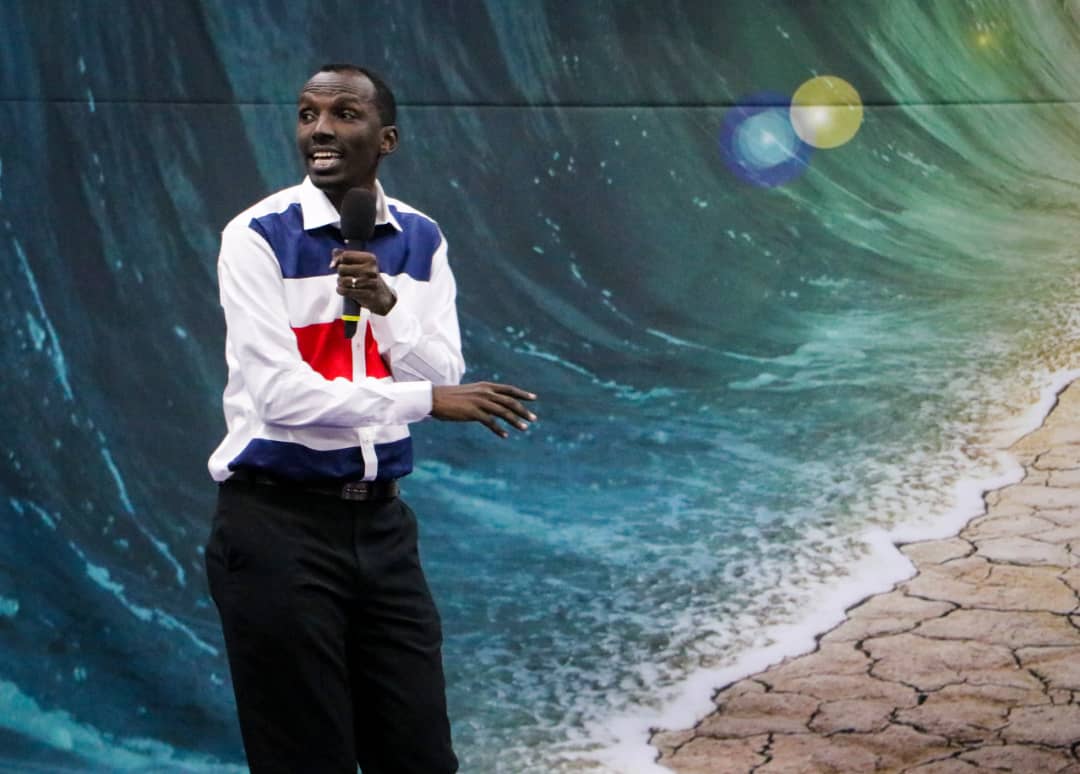If you read this teaching for the first time, it would be better for you to read all the first four parts for a better understanding.
In the fourth part, I spoke about the third group of Christians regarding their response to problems. In the third group there are those who do not fight but constantly complain.
Today I'm going to rely on a biblical example of how the eagle faith can help us to see beyond the problem.
Before entering the Promised Land, Moses sent twelve spies to see the state of the country and on their return, all the people of Israel was waiting for a report. There was two different reports:
The first report came from ten spies and here's what they said to all the people: " We went to the land where you sent us. It truly flows with milk and honey, and this is its fruit. Nevertheless the people who dwell in the land are strong; the cities are fortified and very large; moreover we saw the descendants of Anak there"(Numbers 13: 27-28). You notice that at first they brought a positive and encouraging report until the NEVERTHELESS" appeared. It is this "NEVERTHELESS" that breaks the faith of many Christians.
Before the "Nevertheless", the ten spies said it was a land flowing with milk and honey, and they had evidence in their hands to prove it. After the "Nevertheless", they talked about the power of the people of that country, and especially their impossibility to defeat them.
Instead of giving us the eagle faith, "NEVERTHELESS" gives us the chicken faith. The chicken is always a victim of what is happening around and his natural reaction is to flee. But the eagle is able to rise above the problems and see further.
The ten spies had the chicken faith, which means they were led by the sight by relying on their own strength while two of the ten (Caleb and Joshua) walked by faith in relying on the power of the Lord and His Word. When Caleb heard the pessimistic report of ten spies, he was totally opposed and here is his report: " Then Caleb quieted the people before Moses, and said, “Let us go up at once and take possession, for we are well able to overcome it"(Numbers 13: 30).
I guess the other ten spies took Caleb as if he was unconscious or naive or even mentally sick! If you have the eagle faith, you will always be considered as an unconscious or naive by those who have the chicken faith. He who has the eagle faith is able to pierce the visible world and see what happens in the invisible world.
To be continued in the sixth part
If you want to receive my daily teachings, you can write to me by giving me your phone number plus your country code.
Chris Ndikumana
LA TRADUCTION FRANCAISE
Au-delà des circonstances négatives (Cinquième partie)
Si tu lis cet enseignement pour la première fois, il serait mieux pour toi de lire toutes les quatre premières parties pour une meilleure compréhension.
Dans la quatrième partie, j’ai parlé du troisième groupe de chrétiens concernant leur réaction face aux problèmes. Dans le troisième groupe se trouvent ceux qui ne luttent pas mais se lamentent constamment.
Aujourd’hui je vais m’appuyer sur un exemple biblique pour montrer comment la foi de l’aigle peut nous aider à voir au-delà du problème.
Avant d’entrer dans la terre promise, Moïse a envoyé douze espions pour voir l’état du pays et à leur retour, tout le peuple d’Israël attendait un rapport. Il y’avait deux rapports différents :
Le premier rapport venait de dix espions et voici ce qu’ils ont dit à tout le peuple : « Nous sommes allés dans le pays où tu nous as envoyés. A la vérité, c'est un pays où coulent le lait et le miel, et en voici les fruits. MAIS le peuple qui habite ce pays est puissant, les villes sont fortifiées, très grandes; nous y avons vu des enfants d'Anak » (Nombres 13 :27-28)
Vous remarquez qu’au début ils ont donné un rapport positif et encourageant jusqu’au moment où le « MAIS » a apparu. C’est ce « MAIS » qui casse la foi de plusieurs chrétiens.
Avant le « Mais », les dix espions ont dit qu’il s’agit d’un pays où coulent le lait et le miel et ils avaient la preuve dans leurs mains pour le prouver. Après le « Mais », ils ont parlé de la puissance du peuple de ce pays, leur sécurité et surtout l’impossibilité de les vaincre.
Au lieu de nous donner la foi de l’aigle, le « MAIS » nous donne la foi de la poule. La poule est toujours victime de ce qui se passe autour d’elle et sa réaction naturelle est de fuir. Mais l’aigle est capable de monter au-dessus des problèmes et voir plus loin.
Les dix espions avaient la foi de la poule, ce qui veut dire qu’ils marchaient selon la vue en comptant sur leur propre force tandis que deux autres des dix (Caleb et Josué) marchaient par la foi en comptant sur la puissance de l’Eternel et sa Parole. Quand Caleb a entendu le rapport pessimiste des dix espions, il était totalement opposé et voici son rapport : « Caleb fit taire le peuple, qui murmurait contre Moïse. Il dit: Montons, emparons-nous du pays, nous y serons vainqueurs! » (Nombres 13 :30).
J’imagine que les dix autres espions ont pris Caleb pour un inconscient ou un naïf ou pourquoi pas un malade mental ! Si tu as la foi de l’aigle, tu seras toujours pris pour un inconscient ou un naïf par ceux qui ont la foi de la poule. Celui qui a la foi de l’aigle est capable de percer le monde visible pour voir ce qui se passe dans le monde invisible.
A suivre dans la sixième partie.
Si vous voulez recevoir mes enseignements quotidiens sur Whatsapp, écrivez-moi en me donnant votre numéro de téléphone plus le code de votre pays.
Chris Ndikumana











